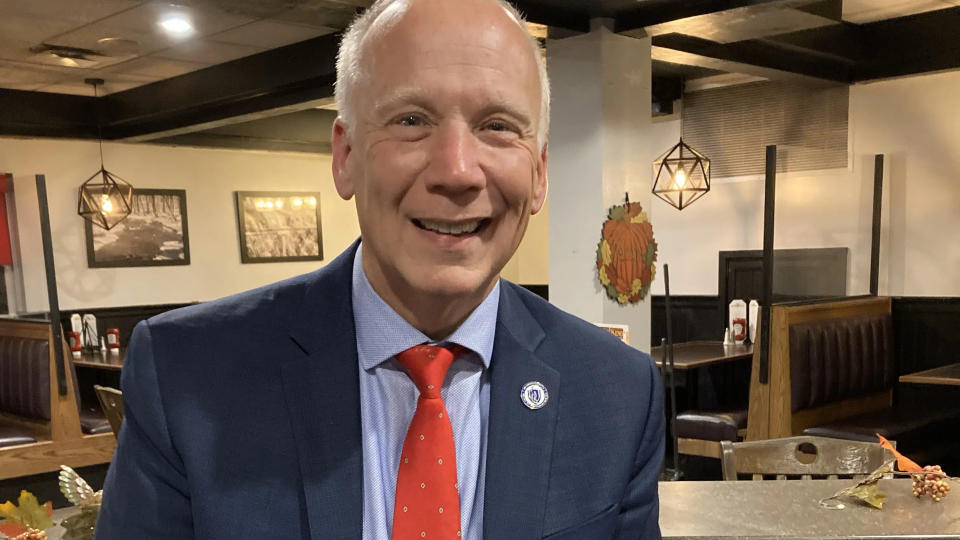Changes to state's emergency shelter law are in the works. What lawmakers might do
BOSTON — A Milford lawmaker says a House-passed bill is the “first step toward really getting a better handle” on the state's rapid growth of the emergency assistance shelter system, but Republicans still feel the measure is missing a key component: altering the state’s right-to-shelter law.
The $245 million supplemental appropriation bill not only funds the shelter system through the end of the year, but adds guidelines such as limits on the lengths of stays in a system that currently houses about 7,500 families.
Massachusetts is the only state with a right-to-shelter law, which guarantees housing for families in need.
The House bill's guidelines limit a family’s stay to nine consecutive months, with additional months being granted to those employed or in training and those with conditions such as pregnancy or disability.

'Keeps the spirit of the law': Proposed $245M for state's emergency shelter systems comes with reforms
“The new requirements are a first step toward really getting a better handle on this program moving forward to try to get a more sensible operation,” said state Rep. Brian Murray, D-Milford.
The Executive Office of Housing and Livable Communities runs the state’s emergency assistance system, and works with care providers such as Worcester-based Friendly House Inc. and the Central Massachusetts Housing Alliance — each of which contributes supplies and services such as basic immigration paperwork, health care and work authorization.
CMHA leader says families view shelter system as 'last resort'
Leah Bradley, the CMHA’s chief executive officer, said families view the shelter system as a “last resort,” with many of them living wherever they can before turning to the state.
“You have to kind of lose everything to get into the system,” said Trish Appert, executive director of Friendly House.
Appert, who works to provide emergency shelter and other social services in Worcester, said that among the 139 families Friendly House has sheltered since November, 43 were from other countries and 96 were from the United States.
Nearly half — 47 — of the 96 American families were from Greater Worcester, she said.
“We’re still seeing a lot of immigrants, but fewer of them,” Appert said. “We do see many, many more who are not seeking shelter, who are coming in for work permit authorization.”
Bill requires Healey to petition feds for temporary work authorizations
The bill would also require Gov. Maura Healey to petition the federal government to permit expedited, temporary and provisional work authorizations for newly arriving migrants, refugees and asylum seekers. Bradley said migrants who have gotten work authorization at a Northborough hotel were able to find work within two to three weeks.
Families in shelters are also given access to housing counseling, with most eventually transitioning to more permanent housing. Appert said the typical family at Friendly House stays for 18 months.
She said an expensive and “tight” market makes it especially difficult for families coming out of emergency assistance to find housing, due to long wait lists for housing vouchers and other programs.
“If you’re a low-income family, getting all your ducks in a row for a landlord when they’ve got five other people lined up for it with less paperwork, it kind of makes them less attractive tenants,” Appert said.
'We want a better life': Haitian asylum seekers share their experiences in MetroWest
Due to the increased influx of families and a subsequent need to increase capacity, the state began renting out hotel and motel rooms. The House bill would require these overflow sites to be open daily until 9 a.m., and for all new overflow housing to be open 24/7.
More than half of the families in the state shelter system are housed in hotels or motels, according to the state’s data dashboard. Roughly 29% of these hotels are serviced by the National Guard, and not providers like CMHA.
Bradley said right now there aren’t enough workers to provide an optimal level of care at unstaffed hotels, but consolidating and increasing the density, she said, will help caretakers support more families.
“We want 24/7 staffing at the hotels,” she said. “If you have a hotel that has 100 families in it, versus five hotels that have 20 families in it, the staffing is less. It’s kind of (like) the economies of scale.”
Republicans sought reforms to state's right-to-shelter law
House Republicans failed to win approval for amendments requiring families that enter the emergency assistance system to have been residents of the state for a certain duration. House Speaker Ron Mariano and Ways and Means Committee Chair Aaron Michlewitz have said Democrats are not interested in removing the right-to-shelter law.
State Sen. Peter Durant, R-Spencer, who has advocated for altering the right-to-shelter law, said migrants are attracted to Massachusetts because of the “cacophony” of free services. He said limiting who falls under the right-to-shelter law would “prevent Massachusetts from being a magnet state,” and reduce the financial stress on social services and the overall budget.

It costs $65,423 on average per family in the program, according to the EOHLC’s latest report from fiscal 2023.
“Massachusetts has to kind of come in line with everybody else and say, ‘These benefits are not available for those who immediately just come in,’” Durant said. “It’s not going to stop the flow completely … but in general it would help us more evenly disperse people throughout the United States.”
Healey and Massachusetts legislators have urged the federal government to provide aid to alleviate the emergency assistance system. Funding so far has been “woefully inadequate,” Durant said.
“The United States Congress will have problems sending money to Massachusetts because they are the only state that has this right-to-shelter law,” he said. “So I don’t think that it’s something that we will see this free flow of money coming from the government.”
Changing the right-to-shelter law will not necessarily stop migrants from coming into Massachusetts either, Murray said. Ultimately, he said, the federal government needs to pass an adequate immigration law to equip states to deal with this crisis.
“Approximately half these folks in the system, they’re not migrants,” Murray said. “They’re Massachusetts families. I think that’s something that has really gotten lost in the conversation.”
This article originally appeared on MetroWest Daily News: Mass shelter assistance law 'first step' for changes, politician says

